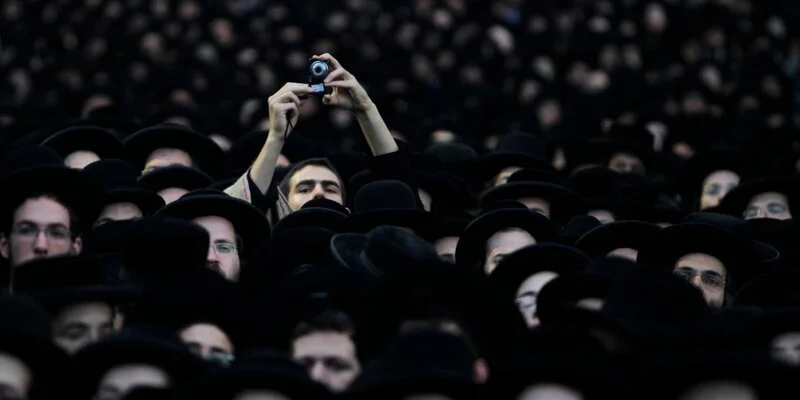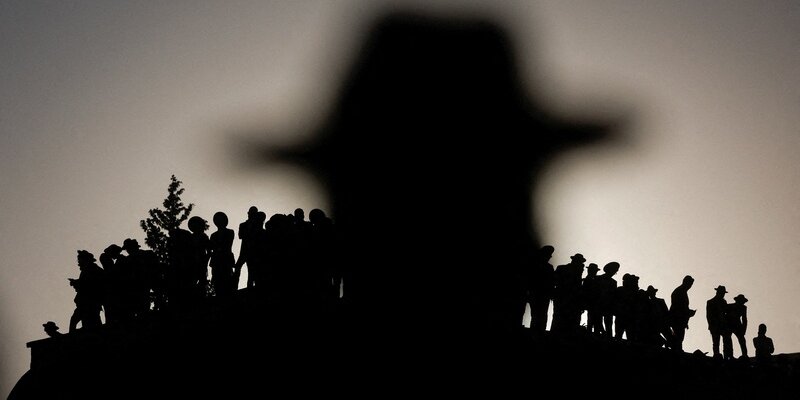Nowhere to Run: LGBTQ Palestinians Struggle to Survive and Israel Closes the Door
While there has been a spike in applications from Palestinian LGBTQ asylum seekers during the war, Israel has tightened the criteria for granting residence permits. They are now being asked to prove that their lives are in danger throughout the Palestinian territories – an almost impossible demand. As a result, many of them stay in Israel temporarily or illegally, while violence, prostitution and racism are almost a daily occurrence. ‘When you don’t have documents – you don’t exist’


While there has been a spike in applications from Palestinian LGBTQ asylum seekers during the war, Israel has tightened the criteria for granting residence permits. They are now being asked to prove that their lives are in danger throughout the Palestinian territories – an almost impossible demand. As a result, many of them stay in Israel temporarily or illegally, while violence, prostitution and racism are almost a daily occurrence. ‘When you don’t have documents – you don’t exist’

While there has been a spike in applications from Palestinian LGBTQ asylum seekers during the war, Israel has tightened the criteria for granting residence permits. They are now being asked to prove that their lives are in danger throughout the Palestinian territories – an almost impossible demand. As a result, many of them stay in Israel temporarily or illegally, while violence, prostitution and racism are almost a daily occurrence. ‘When you don’t have documents – you don’t exist’
A young LGBTQ Palestinian man who previously fled to Israel. Photo: Fadi Amun

Fadi Amun
June 12, 2025
Summary


Listen to a Dynamic Summary of the Article
Created using NotebookLM AI tool
When the Ramadan sunset enveloped Haifa a few weeks ago, the doors of Beit el-Meem were wide open. Inside, the aromas of meals cooking mixed with the sweet smell of knafeh and other desserts. Seated around long tables were members of the Arab LGBTQ community, who had gathered for an iftar meal (A fast-breaking evening meal of Muslims in Ramadan at the time of adhan of the Maghrib prayer). The conversation was mainly about life itself, and not about their fears, the law, or their struggles with the residency authorities. There was laughter and a sense of warm belonging filled the air. For many of the guests, this was their only opportunity to celebrate Ramadan without anxiety.
The vast majority of the participants, many of whom bear the emotional scars of troubled lives, prefer not to reveal their true identities. One exception is Alexandra, who agreed to speak candidly about the daily struggle for survival experienced by many members of the LGBTQ community in Palestinian society.
“I am a 22-year-old transgender woman,” Alexandra told Shomrim. She was born in Jerusalem but lived for most of her life in Hebron. “My father was married to three women and I have 20 siblings. When I was 15, I recognized my sexual orientation for the first time. I very quickly understood that it was something my family could never accept. I was living under constant threat – mainly from my father and my nonbiological brothers. They tried to control me, wouldn’t let me leave the house alone, locked me in my room, beat me and threatened me.”
Alexandra continues to open up about her life with remarkable candor.
“There were occasions when they sent other people to hurt me. One of them even invited me out on a date – and then tried to stab me to death with a knife. When I came to, I had been thrown in the street at four o’clock in the morning, wounded, and I didn’t know what had happened to me. I managed to make it to an army checkpoint and they treated me and called the police. At first, my mother tried to ‘cure me,’ but later realized there was nothing to cure, that she was dealing with a little girl who needed love.”
Alexandra’s partner, Ahmad Abu Murkhiyeh, was murdered in October 2022 in Hebron in what is widely seen as a homophobic hate crime. “I’m still trying to recover. Today, I am in a relationship with myself,” she says. “After my father died, we returned to Jerusalem, because his sons from his other wives started to threaten me too. At least now I have a good relationship with my mother and the siblings who grew up with me. They were small when I transitioned, so, as far as they are concerned, this is just who I am. They accepted me and that is something I cannot take for granted.”
Alexandra adds that, to earn enough money to live on, she was employed in prostitution for a few months; she did not earn much, she says, enough for groceries and basic supplies for her mother and siblings. She says that she had relations with men who, in exchange, gave her coupons or bought her things she needed for the house. Her mother did not know.

“There were occasions when they sent other people to hurt me. One of them even invited me out on a date – and then tried to stab me to death with a knife,” says Alexandra
The war closed the few remaining openings
According to figures released by the Aguda – The Association for LGBTQ Equality in Israel – in 2022 there were 194 asylum requests from members of the Palestinian LGBTQ community. In 2023, that number rose to 254, with almost 40 percent of those requests arriving during the last three months of the year, after the outbreak of the October 7 war. In 2024, Israel received 425 such requests, a spike of 67 percent. However, the proportion of requests being approved dropped from around 90 percent to less than 60 percent.
Some of those seeking asylum are given residency permits for just one month; others are forced to prove that their lives are in danger in the Palestinian Authority – an arbitrary and unprovable demand. In fact, the war has closed off for many members of the Palestinian LGBTQ community the few exit routes that existed. They have no way of leaving the Palestinian territories and no one to turn to in Israel.
At the same time, the existing support systems are collapsing under the weight of both economic and emotional strain. Meeting with them underscored just how deeply this community is caught in limbo: they are not recognized by the Palestinian Authority, from which they fled, nor are they accepted by the country to which they escaped. They lack identification documents and legal status, and at times, they don’t even have a place to sleep. As a result, like in Alexandra’s case, many are forced into prostitution—or, in the best-case scenario, exploited in public works programs that pay a pittance.

in 2022 there were 194 asylum requests from members of the Palestinian LGBTQ community. In 2023, that number rose to 254. In 2024, Israel received 425 such requests, a spike of 67 percent.
‘Every six months, I get a temporary residency permit’
“I am not considered an Israeli citizen. I am just an asylum seeker. All of my siblings got an [Israeli] identity card; I was the only one who didn’t, because when I was born, my father was in prison and was using drugs most of the time,” says Peter Barakat, a 26-year-old from East Jerusalem who fled a life of violence at home after he was outed as gay against his will.
Peter’s story is not unusual. Since the outbreak of the war, the number of members of the Palestinian LGBTQ community seeking assistance has climbed by dozens of percent. Asylum seekers from the West Bank, East Jerusalem or citizens of a state with no actual rights, are encountering a new obstacle: Israel has made it much harder to meet the criteria and is now only issuing temporary residency permits. “Every six months, I get a temporary permit,” says Peter, who also says that there has been a marked increase in racism in Israel since October 7.
Three years ago, Shomrim published an investigation into the dire state of members of the Palestinian LGBTQ community who have sought asylum in Israel. The investigation included descriptions of familial abuse and the harsh reality of disenfranchisement. The article led to a public outcry and was followed by a hearing in the Knesset, chaired by former MK Ibtisam Mara’ana and attended by the undersigned, at which the state announced a significant new step: it would grant work permits and correct “a historic injustice.” That decision was all but erased by the war.
“Since the start of the war, we have witnessed an unprecedented rise,” says Yael Sinai Biblash, CEO of the Aguda. One of the key problems, according to Sinai Biblash, is the more stringent criteria determined by the state. “Today, asylum-seekers are being asked to prove that their lives are in danger in every part of the Palestinian Authority. In other words, even if you are being threatened in Jenin, the state could just tell you to move to Ramallah. It’s an impossible, arbitrary and primarily dangerous demand.”
According to Sinai Biblash, this is not just about numbers. “The most dramatic change is in the state’s attitude. In the past, around 90 percent of the supplicants would get a residency permit; today, it’s less than 60 percent. And the permits themselves are shorter; sometimes for just a month, sometimes for three months. That does not give the asylum-seekers any stability and they can’t plan ahead.”
"In the past, around 90 percent of the supplicants would get a residency permit; today, it’s less than 60 percent. And the permits themselves are shorter"

But even a residency permit does not guarantee safety and stability. “Even people who have permits or are in the process of getting one can find themselves being deported. We received reports about cases when people had their permits confiscated and their identity cards taken – and simply dumped on the other side of the border. Sometimes there is violence involved and sometimes they are not even allowed to take the cell phone with them – and they have no idea where they are. This kind of thing is happening a lot more frequently than ever before.”
Sinai Biblash adds that the people involved are facing a daily struggle to survive. “Many of them live in the street, are vulnerable to being assaulted; some of them are engaged in prostitution. Not out of choice, but because they have no other way to survive. When you don’t have documents, you can’t get legal work, an apartment or medical insurance. You simply don’t exist.”
According to Sinai Biblash, there is almost zero access to any kind of treatment. “Most of them cannot get medical or psychological treatment. They don’t have insurance and they can’t open a file with an HMO. Even those who have experienced trauma do not have any access to long-term treatment.”
The problem, she stresses, is not budgetary – it’s deep-rooted. “The state is washing its hands of them. We are trying to provide a solution, but we do not have the resources. We only had 20 legal aid slots available at the start of the year, and they were all gone within two months. The number of rejections is huge and our needs are only growing.”

Insufficient budgets and a collapsing community
Amid all of these deteriorating circumstances, even Beit el-Meem – one of the few centers which has been continuously providing services to members of the Palestinian and Arab LGBTQ communities – is in danger of closing, since its current budget does not meet the operating costs of the center. Hamudi Omar, the director of Beit el-Meem, describes a situation of ever-increasing demand, a hotline that they can only afford to operate for a few hours a day and a community in collapse due to social alienation and racism.
Several Israeli organizations which advocate for LGBTQ rights operate in Arab society. Chief among them are the Aguda; the Israel Gay Youth (IGY) movement, which is active in dozens of communities across the country; Al Qaws, a Palestinian LGBTQ organization which focuses on raising awareness, emotional support and organization cultural events; and Beit el-Meem, which mainly focuses on Israeli-Arab society and operates a hotline, provides emergency assistance and a safe space for Arabic-speaking members of the LGBTQ community. For many of these young people, Beit el-Meem is arguably the most important of these organizations.
According to Omar, his organization gets some of its budget from the Aguda, but most comes from donations. He admits that, despite the desire and commitment to helping the Palestinian LGBT community, the center faces a dilemma it has difficulty solving. “We operate a hotline with a team of volunteers, a social worker, there’s a community in Haifa and one in Tel Aviv; we organize events on holidays and we meet with figures from the community. But the budget simply isn’t enough.” There is also a growing concern among these organizations that the Ministry for Social Equality is about to withdraw funding from LGBTQ groups.
“Before the war, we tried to run campaigns, but we encountered threats, our billboards were destroyed and there was violence,” says Omar when asked why it is so hard to raise funds. “A very large part of Arab society does not accept us and some see us as an Israeli body. That is a complexity it is very hard to deal with.”
The stories of Alexandra, Peter, and their entire community serve as an urgent call to action. These are individuals struggling to survive, fighting for their right to live in safety and with dignity. Yet when the state imposes near-impossible criteria for asylum, and the organizations best equipped to help are buckling under the pressure, their future remains gravely at risk.
In Response to Shomirm’s questions about toughening the criteria for members of the Palestinian LGBTQ community, the Coordinator of Government Activities in the Territories said that: “The Welfare Staff Officer in the Civil Administration works to provide protection for applicants—including Palestinians across the LGBT spectrum—in accordance with the law and international conventions. As stipulated by the inter-ministerial committee’s decision, the Welfare Staff Officer seeks an appropriate solution for applicants within the Palestinian Authority territory. Only in cases, when it is determined that applicants face danger throughout all areas of the West Bank, will the officer recommend that a temporary permit be granted on welfare grounds.
"It should be emphasized that the criteria have not changed. Nonetheless, since October 7, 2023, and the imposition of the security closure on the territories, in many requests received from individuals claiming protection; upon examination, it was found that some had other motives and did not have a need for protection. It should be noted that those whose requests are denied may submit an application for reconsideration, and the matters will be reviewed professionally and in accordance with the law.”













